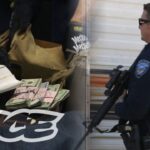The Surprising Truth About ‘Dirty Money’
JUNE 21, 20088:00 AM ET
HEARD ON WEEKEND EDITION SATURDAY
By John BurnettNine months of reporting on “dirty money” — money seized from suspected drug traffickers — leads one reporter to the conclusion that you often find what you weren’t looking for when digging into a story.
Good reporting can sometimes be a series of revelations of aha! moments. In this Reporter’s Notebook, NPR’s John Burnett shares some of those moments from nine months reporting on law enforcement agencies that have grown dependent on seized drug money.
JOHN BURNETT: One of the things I love about journalism is when I begin an investigation with one idea and finish with something completely different. That’s what happened with Dirty Money, a series by producer Marisa Penalosa and me that aired this week. The stories explained the culture of law enforcement that has grown up around confiscated drug money. It all started off last year with a tip from a former DEA agent. Money laundering, he told me, is the most underreported story in the drug war. OK, cartels, shady bank transfers, offshore shell companies – I’m interested. But as it turned out, that wasn’t the story because as Jerry Robinette told me, a senior agent with U.S. Immigration and Customs Enforcement…
Mr. JERRY ROBINETTE (Senior Agent, Immigration and Customs Enforcement): There’s no doubt in my mind that the amount of money they get smuggled out through the southwest border is staggering.
BURNETT: Drug trafficking cartels are not laundering these profits. The DEA estimates 12 billion dollars a year in drug proceeds is repatriated annually from the United States to Mexico, and most of it is smuggled back as raw currency, dirty money, according to Corporal Mark Frost of the Kingsville, Texas Police Department.
Corporal MARK FROST (Kingsville, Texas Police Department): The stench on the money, it smells as so it went from doper to doper on the street, from drug house to drug house to drug house. And by the time it’s packaged up and on its way back into Mexico when we make the seizure, the smell on this money it’s just so incredibly bad. You can actually smell the chemicals on the money. It’s really, really bad. We’ll take it up to the bank and the poor tellers, you know, are like, oh, no, here they come. They got that stinky money. I mean, they say it. It’s filthy.
BURNETT: I planned to track drug profits into the Mexican cartels but it was much more eye-opening to see what happened to dirty money once it went in to the accounts of American law enforcement. In some places, police departments are addicted to seizing drug money. They have to have it for the basic expenses of their departments. For instance, Hopkins County in Northeast Texas is in a squabble with the state police over who lays claim to drug money seized on Interstate 30. Cletis Milsap is the county judge.
Judge CLETIS MILSAP (Hopkins County, Northeast Texas): I’ve seen it. You open up a big suitcase and here’s 300,000 dollars or here’s a million dollars. I mean, this is money that’s on the black market, and everybody is fussing about it.
BURNETT: The oldest advice in journalism is still the best: follow the money.
SIMON: NPR’s John Burnett.
Copyright © 2008 NPR. All rights reserved. Visit our website terms of use and permissions pages at www.npr.org for further information.
NPR transcripts are created on a rush deadline by an NPR contractor. This text may not be in its final form and may be updated or revised in the future. Accuracy and availability may vary. The authoritative record of NPR’s programming is the audio record.


